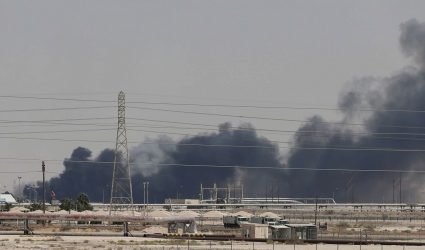Oil Jumps Above $71 After Key Saudi Crude Terminal Attacked

(Bloomberg) – Brent oil surged above $71 a barrel after Saudi Arabia said the world’s largest crude terminal was attacked, although output appeared to be unaffected after the missiles and drones were intercepted.
Futures in London jumped as much as 2.9% to the highest since January 2020 before easing slightly. The kingdom said a storage tank at Ras Tanura in the country’s Gulf coast was targeted on Sunday by a drone from the sea. The terminal is capable of exporting roughly 6.5 million barrels a day — nearly 7% of oil demand — and, as such, is one of the world’s most protected facilities.
The assault follows a recent escalation of hostilities in the Middle East region after Yemen’s Houthi rebels launched a series of attacks on Saudi Arabia. The new U.S. administration has also carried out airstrikes in Syria last month on sites it said were connected with Iran-backed groups.
Oil’s rally accelerated last week after Saudi Arabia and OPEC+ made a surprise pledge to keep output steady in April. The move prompted a raft of investment banks to raise their price forecasts, with Goldman Sachs Group Inc. estimating global benchmark Brent will top $80 a barrel in the third quarter.
The broader market is also being supported by bullish Chinese export data and the outlook for U.S. stimulus. President Joe Biden is on the cusp of his first legislative win with the House ready to pass his $1.9 trillion Covid-19 relief plan, the second-biggest economic stimulus in American history.
“It’s a perfect mix of bullish news at the moment,” said Warren Patterson, head of commodities strategy at ING Bank NV in Singapore. “It does seem that these attacks are picking up in frequency, so the market may need to price in some risk premium.”
The rally north of $70 a barrel means a big headache for Asian refiners, which are warning that the rapid surge and spike in volatility will hurt demand and whittle away still-tight processing margins. Saudi Arabia has also boosted the official selling prices of its crude to buyers in the region for April.
The Sunday attack is the most serious against Saudi oil installations since a key processing facility and two oil fields came under fire in September 2019, cutting oil production for several days and exposing the vulnerability of the Saudi petroleum industry. That assault was claimed by the Houthi rebels, although Riyadh pointed the finger at Iran.

